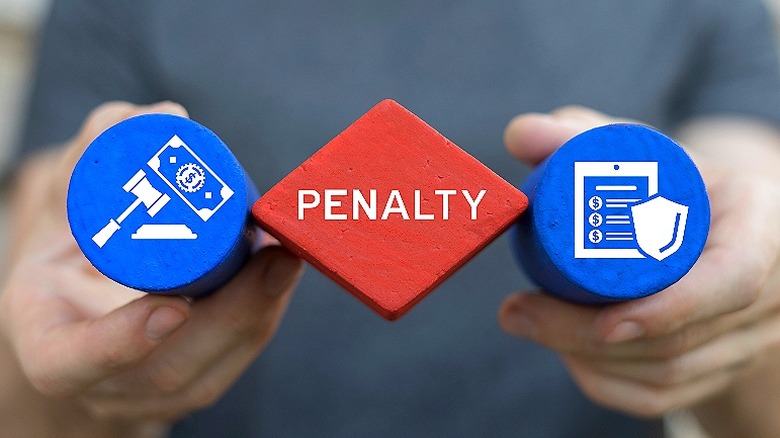5 Reasons People Use Social Security Early (And 5 Reasons People Don't)
The Social Security benefit that underpins many Americans' retirement planning is a hotly debated subject. Some experts suggest waiting for as long as possible to begin drawing Social Security, while others contemplate the merits of taking benefits as early as possible. In reality, everyone's needs as they age toward retirement will be unique to their own circumstances and financial past and future. Some people will indeed benefit from a start to benefits earlier than full retirement age – perhaps as early as 62, the first age you can begin receiving benefits, while others would be wise to wait until 70, when benefit value maxes out.
There's no getting around the fact that a variety of reasons can sway a soon-to-be-retiree to either initiate or delay taking Social Security benefits. There are some circumstances, like the sudden need to pay for increased medical expenses, that can sway this decision in a definite direction. However, plenty of factors fly under the radar and can be a little harder to make sense of from a surface level exploration. With this said, these are five of the reasons why you might consider early usage, and five more that advocate for a delayed draw strategy.
Early: To stop working
Some people nearing retirement will take a look at their finances, the retirement savings accounts they've created, and the potential Social Security benefit they're entitled to and decide that they can simply stop working. Maybe this describes you, and you've saved diligently enough to take early retirement without falling into some kind of fiscal hole.
Savers should note, however, that experts suggest a roughly 80% figure for your retirement income compared to your existing paycheck. This means that if you earn $100,000 annually today, then you should be aiming to generate $80,000 a year in retirement. This funding will typically be built from a combination of Social Security payments, pension payouts, and individual retirement assets. If you can achieve whatever your personal retirement income figure is without waiting until you turn 65 or perhaps even later, exiting the workforce early and initiating Social Security withdrawals may be a great option.
Some don't particularly like what they do and are only looking to earn their paycheck and get home at the end of the day. If this describes your relationship with work, then launching an early retirement as soon as you hit your savings figure might be the best approach. This, however, is not a great idea for those who hit 62 and simply decide to start taking Social Security benefits without building out any other aspects of a functional retirement plan.
Later: To improve the benefit payout rate
Instead of taking their Social Security benefits early, many people wait until they reach their full retirement age (either 66 or 67 in the current climate, depending on your birth year) or even delay taking benefits beyond that mark in order to maximize the value of their monthly Social Security checks. At full retirement age, you'll receive a 100% benefit, while an early draw will bring about a reduced benefit (70% at age 62). Moreover, by waiting a little longer, you'll get a boost above the full retirement benefit, capping at 124% when you turn 70.
In the same way that some workers will be seeking an exit from the workforce as soon as possible, others might be considering delaying their retirement for one of many positive reasons. If this is you and you're considering a delayed retirement, you might also consider waiting to start taking Social Security benefits in order to increase the monthly benefit you receive. More money will create more opportunities for you to fully enjoy your retirement years, so waiting a little bit longer will give you an extra few hundred dollars, if not more, to play with every month when you finally do decide to initiate your benefit payout.
Early: To help cover increased monthly expenses
Although it's generally not a good idea, some people opt to begin drawing Social Security benefits early, specifically while they're still working, in order to cover increased monthly expenses. Paying the bills is an important financial responsibility, and a sudden increase in outgoing expenses can be both surprising and stress-inducing. For example, you might find yourself suffering from the weight of a heightened interest rate if you're paying a mortgage on an adjustable or variable term, or maybe you suddenly find yourself paying hundreds of dollars more per month because you have to buy a new car to replace one that's broken down.
For those who have passed their 62nd birthday, it might be tempting to consider drawing on what Social Security has to offer in order to make ends meet. Under extreme circumstances, like the threat of foreclosure, this might be the only viable solution. Indeed, it's not necessarily a choice that people should always avoid, but taking Social Security benefits early to cover routine expenses is generally a poor financial decision. Even so, during periods of extreme inflation or economic duress, this may be unavoidable and offer a crucial lifeline. Case in point: During the housing market meltdown in 2008, an increased number of seniors started drawing Social Security funds early, according to the Urban Institute, likely to help manage newly ballooned living expenses.
Later: To avoid a penalty for continuing to work
One feature of the Social Security benefit scheme that many people fail to understand is that early distribution can come along with a penalized benefit figure. For those who plan to continue working while they utilize Social Security benefits, a careful consideration of income thresholds should be made. According to the Social Security Administration, for every $2 earned over a certain threshold, your Social Security check will be reduced by $1; in 2024 that figure was $22,320. What this means is that anyone earning over an income of ~$65,000 per year would see their Social Security benefits slashed to zero, assuming they're entitled to the average payout figure of around $1,800 per month.
Utilizing a lesser-known Social Security rule can help you avoid this issue if you've already started taking benefits and decide to return to work. As for anyone who plans to take Social Security without leaving their job, making a few calculations first to understand how this will affect their payout is crucial.
Early: To field an influx of medical bills
Despite possible penalties, there's no getting around certain financial demands. For instance, it's a fact of life that medical expenses exist and are almost exclusively more costly than any reasonable person will expect or ultimately want to pay. People who have enjoyed good health throughout their life sometimes fall into a cycle of requiring more and more care as they age, while others might end up traversing most of their retirement with hardly an incident. There's a kind of cosmic randomness when it comes to medical bills and health care, as there's no telling how you and your health will stack up in the grand scheme of things, and the changes can take place rapidly.
Some people nearing retirement may find themselves having to deal with a sudden and potentially expensive medical burden. Funding treatments or prescription needs might not be feasible on your existing income, and taking Social Security benefits early can bring a new infusion of cash into your life to help cover this new routine expenditure. It's always a good idea to look at other ways you can transform your budget first, like cutting out certain discretionary spending categories such as eating at restaurants on a frequent basis. However, even after exploring budget-cutting measures you may still require additional financial help. Social Security benefits can be this game changer.
Later: To account for living to a fairly old age
Though it may be morbid to discuss, taking benefits early is a good choice for those who expect to die somewhat young. Realistically, if your family history shows a penchant for dying earlier rather than later, a strategy to retire as early as possible and enjoy as much time you have left is probably worthwhile.
For these individuals, it might make sense to take Social Security contributions to their retirement income as soon as possible. The payout you receive will live alongside you for the rest of your life, whether that's a lifetime that reaches the age of 70 or 110. On the flip side, if you think you'll live quite a bit longer than the age you retire, it might make more sense to wait and take your benefit once it has matured to a 100% payout rate or even higher.
Early: To use it simply because it's yours
Many people who have worked hard throughout their life simply want to start cashing in on that work ethic, which means drawing on their Social Security now. This said, there's a sort of actuarial math that goes into considering how long you expect to live versus how much you stand to gain by taking Social Security benefits at any particular age. Generally speaking, by around 80 years old, the lifetime benefit figure you'll have collected if you choose to wait will surpass that of an early start. But even in the face of that calculus, it's tempting to simply cash in and start getting paid back.
For planners who have saved diligently year after year, Social Security benefits might ultimately come to represent a nice addition rather than a must-have cash infusion. Of course, only some of the wealthiest Americans around will be able to fund their retirement completely on their own without the help of Social Security income, which averages about $1,800 a month, with lower figures for those who draw early and higher for those who wait.
If your personal savings portfolio won't demand a few additional hundred dollars per month to remain solvent, you might consider drawing on Social Security early just because you can. There are certainly people who do this, although taking benefits early for a purpose or waiting because you don't need them generally acts as a more strategic approach.
Later: To save it because you don't need it
Many investors have opted to include rental properties (this is the best time of year to look for one, by the way) in their investment portfolios, either as part of a self-directed IRA or in other aspects of their portfolio. Regardless, if you own real estate property as part of your nest egg, or any other kind of income-generating asset that produces monthly dividends at a high volume, you may not need to start drawing Social Security checks when you decide to hang up your boots.
Your individual investments, including these passive income-generating assets, may be enough to provide you with what you need financially as you exit the workforce. If this is the case, you should firstly thank your good fortune because you're part of an elite class of individuals when it comes to creating and managing your savings portfolio; however, you can also rest easy knowing that a delay to your Social Security benefits is possible.
If you don't need the money now, then there's no reason to start drawing benefits when they will continue to increase by simply doing nothing. You might consider taking your benefits later in order to generate even more financial stability a few years down the road.
Early: To invest it (per Dave Ramsey)
Dave Ramsey is a fierce opponent of Social Security. He and others like him generally consider Social Security a negative quirk of the American tax landscape that takes money from young people in order to pay them back when they ultimately get around to old (retirement) age. For plenty of detractors, personally managed pension options seem more equitable and beneficial. But Ramsey isn't just a dissident voice on the subject, he offers a unique take on how workers can maximize Social Security contributions.
Americans who follow Ramsey's advice might consider taking their Social Security checks at 62, even if they don't plan on retiring early. By doing this, you'll gain access to a new infusion of funds that can be directed straight into your retirement savings accounts. By Ramsey's calculation, taking your Social Security benefit as soon as you possibly can and then investing the entire sum of each month's check will provide you with a larger capital gain than you would receive if you waited to cash in on these benefits, allowing them to grow on their own.
Investing your Social Security in a solid growth option, such as an index fund that tracks with the total market, could help you squeeze out as much value as possible from this money while steadying it against downside potential. This approach is certainly something worth considering.
Later: To maximize COLA protection
Another reason to delay initiating Social Security benefit payments has to do with the figure you receive, but goes beyond the number itself. Every year, Social Security benefits are adjusted based on cost of living and inflation figures; this increase is known as a cost-of-living adjustment or COLA. In 2024, that jump was 3.2%, while the year before Social Security checks received an 8.7% boost over the previous monthly amounts (in 2025, the COLA increase is predicted to be 2.5%). One reason to consider delaying Social Security benefits focuses on these COLA rates. While your benefit payout will certainly be higher if you wait a year, the cost-of-living adjustment is also affected.
Because the cost-of-living adjustment is a percentage-based change and not a flat adjustment, a lower figure on your monthly Social Security checks will result in a growing incremental reduction seen in yearly increases to account for inflation and other cost-of-living changes that occur naturally. The weight of this adjustment in terms of missed opportunity will be experienced more heavily as time goes on. Waiting to take your Social Security benefits not only gives you access to a higher monthly figure, but it also protects you a little better when accounting for these adjustments.










